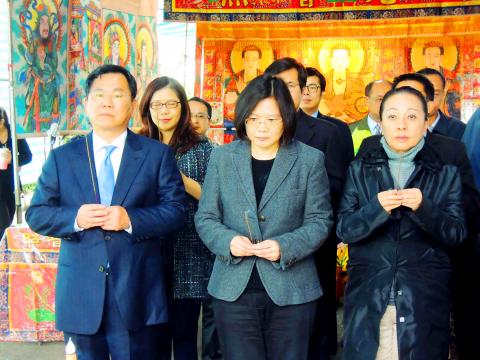Taiwan needs a pair of wings to lift its economy and emerge from its current economic stagnation, and improvements to local economies and value-added innovation would serve as those wings, former Democratic Progressive Party (DPP) chairperson Tsai Ing-wen (蔡英文) said yesterday.
The development of local economies with a range of characteristics and job creation potential as well as industrial competitiveness coming from value-added innovation and entrepreneurship are crucial for the creation of a new driving force for the economy, Tsai wrote on her Facebook page.
“Neither is dispensable for Taiwan to develop its economy in the face of global financial crisis and future challenges,” Tsai wrote.

Photo: Yang Yi-min, Taipei Times
Agriculture is the key to developing local economies, Tsai said.
The former DPP presidential candidate called for a comprehensive review of the fallow land agricultural policy and for the government to assume a managerial role in developing those lands, without taking property rights away from farmers.
Taiwan was forced to implement fallow agricultural policies after its accession to the WTO in 2002, making the Council of Agriculture “more of a subsidy distributing agency than a policy formulating agency,” she said.
The council’s role should be changed and the ministry should lease fallow land at higher prices than past subsidies so the areas can be utilized to increase agricultural production.
The other wing would be “innovation, entrepreneurship and high value-added products,” which Stan Shih (施振榮), former chairman of the computer manufacturer Acer, also advocated, she said.
Tsai encouraged young people to establish their own businesses with courage and confidence, the same way their grandparents and parents did in the post-World War II era, which later became known as “Taiwan’s economic miracle.”
“It’s time for young people in Taiwan to create their own businesses using innovative ideas. The passion of these young entrepreneurs would get Taiwan’s economy moving again,” she said.
Asked on the sidelines of a folk ceremony in Yilan County yesterday about the current socio-political atmosphere and whether the Cabinet should be replaced, Tsai told reporters that people seem to be experiencing a collective fear caused by financial hardship.
She did not say whether there should be a Cabinet reshuffle, but said “Taiwanese are very aware of how well the administration has performed.”

Taipei has once again made it to the top 100 in Oxford Economics’ Global Cities Index 2025 report, moving up five places from last year to 60. The annual index, which was published last month, evaluated 1,000 of the most populated metropolises based on five indices — economics, human capital, quality of life, environment and governance. New York maintained its top spot this year, placing first in the economics index thanks to the strength of its vibrant financial industry and economic stability. Taipei ranked 263rd in economics, 44th in human capital, 15th in quality of life, 284th for environment and 75th in governance,

Greenpeace yesterday said that it is to appeal a decision last month by the Taipei High Administrative Court to dismiss its 2021 lawsuit against the Ministry of Economic Affairs over “loose” regulations governing major corporate electricity consumers. The climate-related lawsuit — the first of its kind in Taiwan — sought to require the government to enforce higher green energy thresholds on major corporations to reduce emissions in light of climate change and an uptick in extreme weather. The suit, filed by Greenpeace East Asia, the Environmental Jurists Association and four individual plaintiffs, was dismissed on May 8 following four years of litigation. The

A former officer in China’s People’s Liberation Army (PLA) who witnessed the aftermath of the 1989 Tiananmen Square massacre has warned that Taiwan could face a similar fate if China attempts to unify the country by force. Li Xiaoming (李曉明), who was deployed to Beijing as a junior officer during the crackdown, said Taiwanese people should study the massacre carefully, because it offers a glimpse of what Beijing is willing to do to suppress dissent. “What happened in Tiananmen Square could happen in Taiwan too,” Li told CNA in a May 22 interview, ahead of the massacre’s 36th anniversary. “If Taiwanese students or

The New Taipei City Government would assist relatives of those killed or injured in last month’s car-ramming incident in Sansia District (三峽) to secure compensation, Mayor Hou You-yi (侯友宜) said yesterday, two days after the driver died in a hospital. “The city government will do its best to help the relatives of the car crash incident seek compensation,” Hou said. The mayor also said that the city’s Legal Affairs, Education and Social Welfare departments have established a joint mechanism to “provide coordinated assistance” to victims and their families. Three people were killed and 12 injured when a car plowed into schoolchildren and their